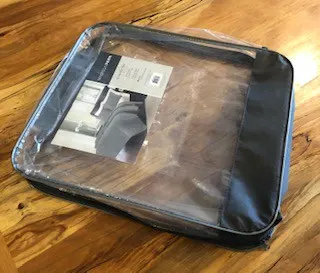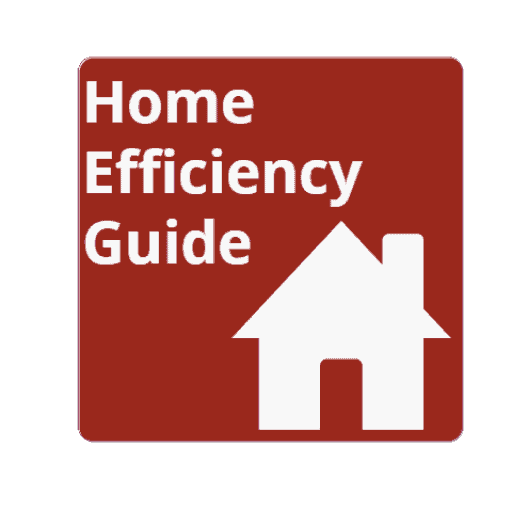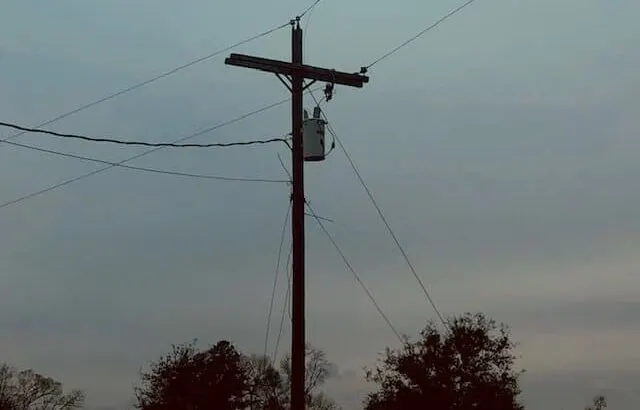I have had the misfortune of living through three hurricanes and multiple ice storms, each followed by days and in some cases weeks without electrical power. I have learned the hard way how dependent we are on the power grid and what is really needed to survive and ensure the safety of comfort of my family during an extended grid-down situation.
Here is what you will need in a power outage:
- A supply of bottled water
- Plenty of non-perishable food
- Toilet paper, paper plates, and plastic utentils
- Flashlights, batteries, matches, and candles
- Weather-specific survival pack (Blackout Bag)
- Security lighting not dependant on the power grid
- A secondary energy source (Emergency Power)
These items are essential to surviving an extended power outage. I want to explain to you why I consider each of these to be essential. Let’s delve into each of these and create a plan for your next grid-down situation.
Bottled Water
Whether the weather during the power outage is hot or cold, you will need to have an ample supply of fresh water. Following the hurricanes, our city’s water supply was contaminated and a “boil alert” was issued. If we had not had an ample supply of bottled water stashed away, I am not sure what we would have done.
Bottled water is relatively inexpensive. There is no reason not to have a few cases stashed away in a pantry or closet for those occurrences when fresh water is not readily accessible.
Pick a few cases up at your local grocery store or, if you are unable to drive for any reason, you can actually order cases of water on Amazon and have it delivered right to your door.
Non-Perishable Food
Items such as can goods and peanut butter are great to keep stocked in preparation for a power outage.
I have also become a fan of having a large supply of these Gourmet Survival Home Food Storage packs on hand as they provide a variety of eating choices to break up the monotony of canned beans and peanut butter. These packs have a 25-year shelf life, are 100% certified GMO free, and provide 120 servings in 19 packets.
These are an excellent option for a family preparing for the worst.
Toilet paper, paper plates, and plastic utensils
You have to remember that you won’t be able to run to the store to pick up toiletries and you won’t be able to wash dishes. Keep these essentials on hand and in good supply.
Flashlights and Candles
When the power is out, it is amazing just how dark a city or rural area becomes at night. We take the constant ambient lighting from street lamps and house lights for granted. When there is a power grid failure, however, you see how truly dark the night is.
I purchased several American Red Cross Blackout Buddy Emergency LED Flashlights off of Amazon and have them plugged in throughout my house. At night, a small nightlight shines from the bottom of them (this goes out when the lights are turned on in the room) that helps to light the way in hallways.

What’s really great about these though is that when the power goes out, they automatically turn on in flashlight mode and shine brightly onto the ceiling, lighting the area. We can remove them and use them as flashlights for walking through the house or just leave them plugged in and they provide lighting for that area.

Of course, you will want to keep an ample supply of spare batteries on hand. The real problem with a power outage is that you never know how long it will last. This is especially true following a disaster.
I recommend planning to use the American Red Cross flashlights first as they will be charged and ready to go the moment the power goes. But have a traditional flashlight and batteries available in case the blackout lasts longer than the American Red Cross rechargeable battery holds power.
Remember, it is always good practice to have a primary and a backup plan for power outages so that if your primary plan
fails for any reason, you have alternatives.
Weather-Specific Comfort and Survival Items
Winter
Days or even weeks without power during a cold winter can be deadly. Keeping warm is essential to survival. Make sure that you are prepared to provide for yourself and your family with these essential items.
Warm Clothes and Blankets

Keep a supply of warm clothes and extra blankets stored in a closet and ready for use. The more layers you are able to put over yourself, the more body heat you can retain. I recommend having at least one thermal fleece blanket that your family can cover up together with in addition to any other blankets that you have on hand. These types of blankets really help to hold in the heat. We’ve also found that a heavier comforter like this down alternative quilt comforter on top is very helpful for holding in heat.
Block Out The Cold
It’s best to keep everyone in a single, small room as much as possible with the door closed. Hanging a heavy blanket up to cover windows will help to keep the cold air outside from coming in. Another really effective approach is to tape an insulator such as bubble wrap or 6 mil plastic sheeting to the windows. I keep a roll of the 6 mil plastic sheeting in my garage. It comes in handy for all kinds of situations but during a winter power grid failure, I would definitely take advantage of this thick stuff to seal my windows in the main room that my family would be riding out the power outage.
Remember that you want to establish a small room where you or your family will stay for the majority of the time during the power outage. Take steps to block out the cold air from outside and to keep as much cover on you (clothing, blankets, or anything you have available) to keep your body warm. Gathering closely together under the covers will also help.

Bonus Tip – Every time my wife purchases new blankets or comforters, I fold up the old ones and store them in the plastic zipper shipping package that the new ones came in. This makes them easy to stack on a top shelf in the closet and keeps them dust free until they are needed.
Heat source
A fireplace or gas heater can be a lifesaver in a winter storm power outage. If you do not have the capability to have one of these in your home, a great tip is to bundle up and use some of those hand and body warmers.
My son and I found that putting a few of these in our sleeping bags really helped to keep us warm during an ice storm last year. They last for hours once you shake them up and activate them. The great thing about items like this is that they can be purchased today and put away in preparation for a winter outage. What you don’t want to do is find yourself in that situation and not have items like this on hand.
Summer
If you live in a hot climate, a power outage in the summer can be miserable. One thing I have learned from the weeks without power following hurricanes in SouthEast Texas is that staying cool is almost impossible without some type of air circulaton.
Stay Hydrated
Your number one priority will be staying hydrated, so those cases of bottled water that we discussed at the beginning of this article will definitely be put to use here.
Keep Your Fridge and Freezer Closed
Food items will spoil quickly as the temperatures in your fridge and freezer drop. To prolong the life of those food products, prevent opening these storage areas except when absolutely necessary. You don’t want to open the fridge and browse. You will want to limit opening it to once or twice per day and quickly grab the items you need.
As the summer heat beats down on your home and warms it to increasingly uncomfortable temperatures, you may be
Use Frozen Foods To Cool Down
If it comes down to it, your health takes priority over frozen foods. If you are feeling the effects of the heat on your body, a bag of frozen peas can provide cool relief. Don’t place it directly against your skin though, wrap it in a towel. And it’s actually best not to put the bag against you anyway but to hold it just an inch or so away from the skin so that you can feel the coolness of it.
Off-Grid Security Lighting
Another valuable lesson from my hurricane experiences is that the looters come out at night. People who value your possessions more than your right to keep those possessions like to move around under the cover of darkness. A large-scale power outage provides a lot of darkness for looters to lurk.
You can deter looters and provide your family with a sense of security by simply incorporating some solar-powered outdoor lighting in your yard.
What I love about this approach is that it is so simple. Just buy some outdoor solar lights and place them strategically around your home to provide accent lighting and security lighting like this solar powered flood light.

Looters would rather skip a house that is well lit and move on down the road to a home that looks more vulnerable. Make your home appear to be more trouble than it’s worth and send the looters packing!
If you’d like to learn more about incorporating solar powered lighting outdoors, take time to read How To Get Started With Solar Power (Simple Solutions!)
Plan For The Worst With A Secondary Energy Source
Extreme circumstances call for extreme measures. Knowing the
The fact that you are reading this tells me that you want to be ready when the power goes down.
If you haven’t already, seriously consider investing in some form of secondary backup power source. This will allow you to keep essential electrical devices such as fridge, freezer, and cellphones operational during the outage.
The two most common types of backup energy sources are fuel generators and solar generators.
Fuel Generator
A fuel generator can run on gas, diesel, propane, or natural gas. Your access to these fuels will be a major influence into which style you choose but as a rule it’s important to know that diesel fuel stores for longer periods than gas and that natural gas is generally less expensive than propane.
I am a big fan of dual fuel generators that can run off of either gas or propane. These generators offer more options for operation which could be an important factor during a grid-down situation.
For example, following the hurricanes, gas was not available for purchase. Once everyone ran out of gas, the generators began to chug and die one by one long before the power outage ended. Had we had dual fuel generators, many like myself could have hooked up to our propane tanks and continued to provide energy to our essential devices.
Champion makes a 3400 watt Dual Fuel generator that has excellent reviews on Amazon and throughout the internet (I spent a lot of time researching this). It has an electric start, includes a 3-year limited warranty, and even comes with lifetime technical support.

There are other sizes available but there are two factors to always consider when purchasing a generator, besides reliability and price of course. Those factors are 1) How much power you need, and 2) How much fuel it will take to run.
Although it flies in the face of many people’s thinking, I have learned that less is often more when it comes to generators. You want to have enough power to run the essential items that you intend to run but not excessively more power. Why, because it usually requires more fuel to operate larger generators.
3000 watts is usually considered the “golden size” for generators. That’s because a system that is designed to power around 3000 watts can handle a freezer, refrigerator, small devices like cell phones, and usually a small window A/C unit.
There’s some math that goes into determining exactly how many watts a generator can support but these 3000 watt systems are generally the best overall size for most situations unless you are looking to make a serious investment into a whole-house generator.
In any case, I do recommend that you consider a fuel generator as a part of your power-outage arsenal. I like the Champion
3400 watt Dual Fuel generator as I stated before because it checks all of the important boxes. Reliability, dual fuel options, electric start, and competitive pricing compared to other brands.
Solar Generator
In the last few years, I have become increasingly interested and excited about portable solar generators. One of the challenges I found with fuel generators is that when fuel becomes unavailable, fuel generators are useless. I always want to invest in a backup plan in case my primary supplemental energy source fails.
In Texas, one thing we get plenty of is sunshine. The idea of being able to recharge my fuel supply on demand is incredibly enticing.
What’s great about these portable solar generators is that they are incredibly light by comparison to a fuel generator, can be operated indoors since they don’t produce harmful fumes, and can be combined with a few solar panels to provide a sustainable power source for an indefinite period of time!
I’ve written a lengthy article on the reasons that a solar generator may make sense for you and you can access it from the link below. What I would like to leave you with here though is this – if you were to experience a sustained power outage for more than a couple of weeks, what would it be worth to be able to run fans in the summer or an electric blanket in the winter and have the confidence that your fuel supply can recharge each day as long as the sun comes out?
Yes, you may face some cloudy days but sooner or later, as the saying goes, the sun will shine again. And when it does, your backup energy source can be refueling itself in preparation for another long night.
If you’d like to learn more about solar generators and why you should consider investing in one, read my article Seven Reasons Why A Solar Generator May Make Sense For You
Conclusion
I don’t like power outages. They are inconvenient and, depending on the weather, they can be dangerous for my family.
But I am ready. I sincerely hope you will be too.
I realize that it’s hard to plan for a power outage when the sun is shining, the electricity is working, and everyone feels fine. But you don’t want to wait until an emergency happens to prepare. That will just ensure that you are unprepared. Print this article out and go through it to make sure that you have the supplies that you need to provide for yourself and your family in the event of a sustained power outage. Invest now so that you don’t find yourself unready when the power goes out.
All my best.
As a homeowner, I am constantly experimenting with making the structure of my house more energy-efficient, eliminating pests, and taking on DIY home improvement projects. Over the past two decades, my family has rehabbed houses and contracted new home builds and I’ve learned a lot along the way. I share my hard-learned lessons so that you can save time and money by not repeating my mistakes.


Leave a comment
You must be logged in to post a comment.